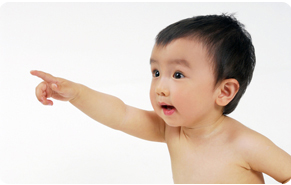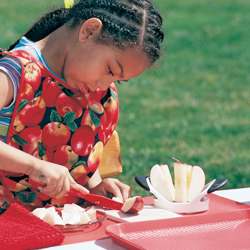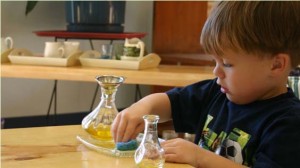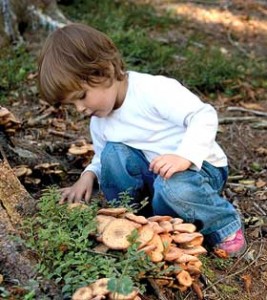 The past few weeks my husband and I have been trying our hardest to remove some of the more colorful language from our vocabularies so that our baby’s first words aren’t profanity. Not that we curse all that much, but knowing children as I do, I know that it only take a few exposures to a word for kids to learn them, especially during the time when they’re busy expanding their vocabularies at a phenomenal rate at around 18 months old. So we’ve been saying funny things like “fire-pants!” and “rats!” or even my husband’s famous “son of a bench!”
The past few weeks my husband and I have been trying our hardest to remove some of the more colorful language from our vocabularies so that our baby’s first words aren’t profanity. Not that we curse all that much, but knowing children as I do, I know that it only take a few exposures to a word for kids to learn them, especially during the time when they’re busy expanding their vocabularies at a phenomenal rate at around 18 months old. So we’ve been saying funny things like “fire-pants!” and “rats!” or even my husband’s famous “son of a bench!”
Autonomy is the holy grail of childhood
 In my work with young people there are some needs that come up again and again. The need for play is a great example. Kids need lots and lots more play than we need and they let us know about their need in ways that are sometimes difficult for us.
In my work with young people there are some needs that come up again and again. The need for play is a great example. Kids need lots and lots more play than we need and they let us know about their need in ways that are sometimes difficult for us.
But the unmet need that I notice most in young children is the need for autonomy. Children desperately need to be able to do things on their own and to choose their own path and luckily for you, there are simple things you can do around the house to support your child’s autonomy.
Focus on the process, not the product
 As many of you know, for the five years after college I was a preschool teacher in Montessori classrooms. I was very intrigued my Maria Montessori and her methods, but what struck me most was her philosophy. There are quite a few key Montessori philosophies that I subscribe to, but today I want to share one that’s near and dear to my heart. Montessori said, “It’s the process, not the product.”
As many of you know, for the five years after college I was a preschool teacher in Montessori classrooms. I was very intrigued my Maria Montessori and her methods, but what struck me most was her philosophy. There are quite a few key Montessori philosophies that I subscribe to, but today I want to share one that’s near and dear to my heart. Montessori said, “It’s the process, not the product.”
What she meant is that for young people, it’s the process of learning that is to be enjoyed and savored. Too often we put the emphasis on our kid’s paintings, drawings, or little cut out shapes, but we forget that it’s the experience of painting, drawing, and cutting that matter most to our child’s development.
Busy bodies
 One afternoon when I was about six or seven I saw my mom sitting in the living room staring off into space. “Wacha doin’?” I asked. “Nothing.” She replied calmly. “Nothing?!” I thought, NOTHING??!!! How could someone not be doing a thing? That was impossible. Hmmm.” As I looked at her she seemed peaceful and happy and whole, so I figured that maybe, just maybe, not doing anything was an all right thing to do.
One afternoon when I was about six or seven I saw my mom sitting in the living room staring off into space. “Wacha doin’?” I asked. “Nothing.” She replied calmly. “Nothing?!” I thought, NOTHING??!!! How could someone not be doing a thing? That was impossible. Hmmm.” As I looked at her she seemed peaceful and happy and whole, so I figured that maybe, just maybe, not doing anything was an all right thing to do.
The older I get, the more I try to be like my mom in that moment. Not the checked out staring off into nothingness part (although that’s kinda nice sometimes), but the part of her that is able just to sit, and contemplate life, and enjoy the present moment. The more years I get under my belt, the more I appreciate just being. And the less I think that it’s the “doing” that will define me in other people’s minds (or in their memory of me once I’m gone). Not that doing is a bad thing; in fact I quite like doing things. But remembering just to be; And to be peaceful and joyful as I go about my daily life.
The importance of observation
 When it comes to babies, at my core, I am a scientist. The process children go through as they transform from a fetus into a walking talking human child in just the first 2 years of life fascinates me. It’s absolutely incredible really. As a scientist, I want to understand all I can about this amazing process. And if there’s one thing I’ve learned that is the same in both my scientific and my Montessori backgrounds, it’s that observation is the key to understanding child development.
When it comes to babies, at my core, I am a scientist. The process children go through as they transform from a fetus into a walking talking human child in just the first 2 years of life fascinates me. It’s absolutely incredible really. As a scientist, I want to understand all I can about this amazing process. And if there’s one thing I’ve learned that is the same in both my scientific and my Montessori backgrounds, it’s that observation is the key to understanding child development.
